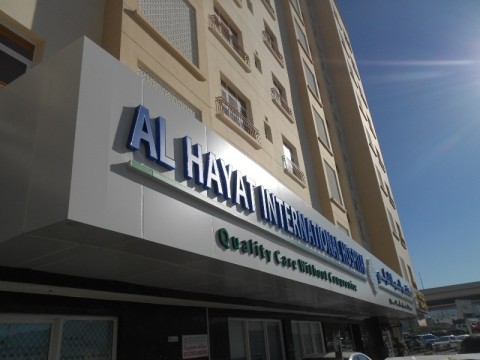Don't miss out on the best jobs!
Subscribe to HelpGoAbroad and weekly we will sent you an email with latest job posts. Provide your email address below
If you are thinking of moving to Bahrain or Oman, you are in good company. Both countries are among the top Middle East destinations for expatriates looking for excellent health and healthcare, according to the HSBC's Expat Explorer Survey 2016.
Here are ten facts you need to know about the similarities and differences between the two countries' health systems. They may help you decide which country offers the most appropriate healthcare for you and your family.
1. Access to care
In Bahrain and Oman, healthcare is available through public and private providers. It is free only for nationals. And, therefore, with the exception of emergency care in government hospitals, expats in both countries must pay for health services and medications.
2. Costs
Cost of living comparisons show that routine medical care is about 50 per cent more expensive in Bahrain than in Oman. For example, a 15-minute visit to a doctor costs 16 BHD (42.44 USD*), compared with 11 OMR (28.56 USD*) in Oman.
Medication prices also vary between the two countries. Antibiotics cost slightly more in Bahrain (6 BHD; 15.91 USD*) than in Oman (5.495 OMR; 14.27 USD*). But cold medicines are 30 per cent more expensive in Oman compared to Bahrain (2.392 OMR; $6.21 USD* vs. 1.646 BHD 4.36 USD*).
*Based on November 2016 exchange rates.
3. Medical cover for expats
Employers in Oman and Bahrain are not obliged to provide medical cover to expat employees. The majority of expats in Bahrain take out private health insurance. However, the Oman Chamber of Commerce and Industry recently launched a scheme, expected to be rolled out in 2018, which will ensure universal medical coverage for all private sector expat workers.
Similar plans have been shelved in Bahrain in 2015, although the Supreme Council for Health later announced that a national health insurance scheme, mandating coverage for expats and Bahrainis, should come into effect in 2019.
4. Standard of care
The Omani and Bahraini healthcare systems are among the most advanced in the Gulf region, boasting state-of-the-art facilities, high levels of health expenditure, and a large number of doctors, nurses and dentists per residents.
The standard of care is generally high, and comparable to that in Western countries. However, this may not be experienced everywhere in Oman, where quality varies across healthcare facilities and regions.
5. Emergency services
Most hospitals in Bahrain and Oman have an accident and emergency department that provides urgent medical care, 24/7. However, the ambulance service in Oman is limited. So, you may need to use your car or a taxi, in an emergency.
The official number for a medical emergency is 999 in Bahrain, and 9999 in Oman.
6. Primary care
Both Bahrain and Oman provide primary care services, offering treatment and preventative interventions. This is the first line of contact in the healthcare system, and works in a similar way to the UK National Health System (NHS). You will need to sign up to your local health centre, to access the services you need.
There are 24 major health centres in Bahrain. As for Oman, primary care has undergone significant geographical expansion in the past few decades. As a result, over 95 per cent of the population is now within five kilometres of a health centre offering primary care services.
7. Specialist care
In Bahrain, you can be referred to a specialist at a public hospital by your general practitioner (GP) or by a doctor at a private clinic. The country's main public hospital is Salmaniya Medical Complex in Manama – a multi-specialty facility providing secondary care services as well as emergency care.
Oman has a network of public government and military hospitals, offering a wide range of specialist services. Examples include Al Hayat International Hospital and Sultan Qaboos University Hospital, in Muscat. Different hospitals provide different specialist services. You will need a letter from a local primary care doctor to access these services.
Dental care in Bahrain and Oman is generally provided by private clinics. It can be expensive, even if you have health insurance, because basic policies usually don't cover dental. But you can choose to pay a premium.
8. Private hospitals and clinics
If you can afford it, or have health insurance, you can register with one of the private hospitals and health clinics. Muscat's Burjeel Medical Centre at Al Azaiba is among the best in Oman. Quality private facilities in Bahrain include Royal Bahrain Hospital, King Hamad University Hospital and the American Mission Hospital.
9. Waiting times
In Bahrain, because of the relatively small population (1.3million, 2015), waiting times are virtually non-existent. Expats report that tests and scans are usually done quickly, often during a visit to the doctor.
By contrast, Oman – with a higher population of 4.49 million, 2015 - has longer waiting times for surgery and other procedures at government hospitals, which is a major reason for nationals choosing private treatment. According to a study presented in the Oxford Business Group's Oman 2016 report, nearly half of all patients seeking care at the country's 11 private facilities are Omanis.
10. Vaccinations
Expats moving, or traveling, to Oman are advised to be vaccinated against meningitis and hepatitis A and B. Immunisation for rabies and boosters for diphtheria, flu, MMR, pertussis, polio and tetanus are also recommended.
Recommended vaccinations for Bahrain include hepatitis A and B, diphtheria, tetanus and typhoid.
Disclaimer: The information included in this article is provided for information purposes only and it is not intended to constitute professional advice or replace consultation with a qualified medical practitioner.
Sign in to publish a comment


Be the first to comment on this post.